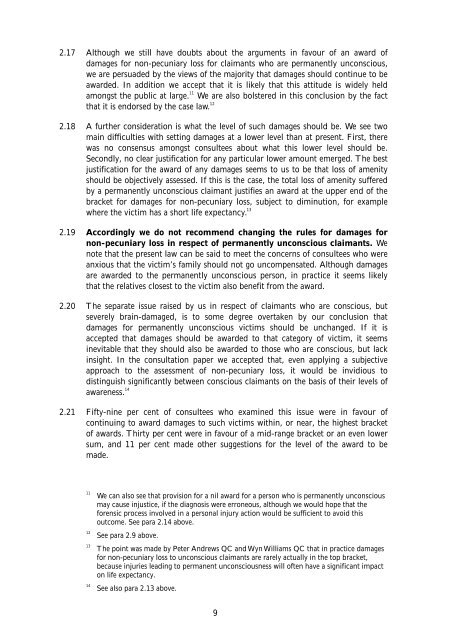damages for personal injury: non-pecuniary loss - Law Commission
damages for personal injury: non-pecuniary loss - Law Commission
damages for personal injury: non-pecuniary loss - Law Commission
Create successful ePaper yourself
Turn your PDF publications into a flip-book with our unique Google optimized e-Paper software.
2.17 Although we still have doubts about the arguments in favour of an award of<br />
<strong>damages</strong> <strong>for</strong> <strong>non</strong>-<strong>pecuniary</strong> <strong>loss</strong> <strong>for</strong> claimants who are permanently unconscious,<br />
we are persuaded by the views of the majority that <strong>damages</strong> should continue to be<br />
awarded. In addition we accept that it is likely that this attitude is widely held<br />
amongst the public at large. 11<br />
We are also bolstered in this conclusion by the fact<br />
that it is endorsed by the case law. 12<br />
2.18 A further consideration is what the level of such <strong>damages</strong> should be. We see two<br />
main difficulties with setting <strong>damages</strong> at a lower level than at present. First, there<br />
was no consensus amongst consultees about what this lower level should be.<br />
Secondly, no clear justification <strong>for</strong> any particular lower amount emerged. The best<br />
justification <strong>for</strong> the award of any <strong>damages</strong> seems to us to be that <strong>loss</strong> of amenity<br />
should be objectively assessed. If this is the case, the total <strong>loss</strong> of amenity suffered<br />
by a permanently unconscious claimant justifies an award at the upper end of the<br />
bracket <strong>for</strong> <strong>damages</strong> <strong>for</strong> <strong>non</strong>-<strong>pecuniary</strong> <strong>loss</strong>, subject to diminution, <strong>for</strong> example<br />
where the victim has a short life expectancy. 13<br />
2.19 Accordingly we do not recommend changing the rules <strong>for</strong> <strong>damages</strong> <strong>for</strong><br />
<strong>non</strong>-<strong>pecuniary</strong> <strong>loss</strong> in respect of permanently unconscious claimants. We<br />
note that the present law can be said to meet the concerns of consultees who were<br />
anxious that the victim’s family should not go uncompensated. Although <strong>damages</strong><br />
are awarded to the permanently unconscious person, in practice it seems likely<br />
that the relatives closest to the victim also benefit from the award.<br />
2.20 The separate issue raised by us in respect of claimants who are conscious, but<br />
severely brain-damaged, is to some degree overtaken by our conclusion that<br />
<strong>damages</strong> <strong>for</strong> permanently unconscious victims should be unchanged. If it is<br />
accepted that <strong>damages</strong> should be awarded to that category of victim, it seems<br />
inevitable that they should also be awarded to those who are conscious, but lack<br />
insight. In the consultation paper we accepted that, even applying a subjective<br />
approach to the assessment of <strong>non</strong>-<strong>pecuniary</strong> <strong>loss</strong>, it would be invidious to<br />
distinguish significantly between conscious claimants on the basis of their levels of<br />
awareness. 14<br />
2.21 Fifty-nine per cent of consultees who examined this issue were in favour of<br />
continuing to award <strong>damages</strong> to such victims within, or near, the highest bracket<br />
of awards. Thirty per cent were in favour of a mid-range bracket or an even lower<br />
sum, and 11 per cent made other suggestions <strong>for</strong> the level of the award to be<br />
made.<br />
11 We can also see that provision <strong>for</strong> a nil award <strong>for</strong> a person who is permanently unconscious<br />
may cause injustice, if the diagnosis were erroneous, although we would hope that the<br />
<strong>for</strong>ensic process involved in a <strong>personal</strong> <strong>injury</strong> action would be sufficient to avoid this<br />
outcome. See para 2.14 above.<br />
12 See para 2.9 above.<br />
13 The point was made by Peter Andrews QC and Wyn Williams QC that in practice <strong>damages</strong><br />
<strong>for</strong> <strong>non</strong>-<strong>pecuniary</strong> <strong>loss</strong> to unconscious claimants are rarely actually in the top bracket,<br />
because injuries leading to permanent unconsciousness will often have a significant impact<br />
on life expectancy.<br />
14 See also para 2.13 above.<br />
9

















